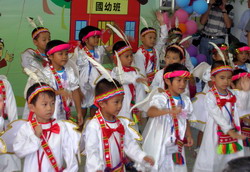Building a starting point for the lives of disadvantaged children

Not all children are born with equal educational opportunities. In order to uphold social justice, Minister Tu Cheng-sheng of the MOE indicates that, to give disadvantaged children full and equal opportunities to fulfill themselves and to enforce the policy of equal educational opportunities, the nation's resources have to be utilized to help socially, economically, culturally, and regionally disadvantaged children. A quality education environment for disadvantaged, five-year-old children has to be built to safeguard their right for education.
Minister Tu emphasizes that during the preschool education stage, the molding of children's personality and development of their intellect facilitate positive growth of their future aptitude, interest, and ability. For socially and economically disadvantaged children who have difficulty receiving education, early intervention helps realization of equal education opportunity.
Young children are highly moldable both physically and mentally. This stage is the critical stage for their learning. Minister Tu says early education tailored to an individual child's needs helps develop the child's potential. Through realization of the ideal of equal educational opportunity, a high percentage of disadvantaged children are given the opportunity to move upwards in society in an effort to avoid the vicious circle for them to stay at the bottom of society and achieve the goal of pursuing social justice.
With the policy of "the disadvantaged come first, enforce social justice" in mind, Minister Tu points out that the MOE has drawn up the Plan to Help Five-Year-Old Disadvantaged Children Receive Early Education as the near-term plan to extend national education downwards. The plan gives disadvantaged five-year-old children the opportunity to receive quality education.
According to the plan, in the 2004 school year, five-year-old children of the three offshore islands began benefiting from the plan. In the 2005 school year, five-year-old children of 54 aboriginal towns and villages were included in the plan. In the 2006 school year, the plan will encompass all five-year-old children nationwide. It is hoped, through implementation of the plan, all disadvantaged five-year-old children will be given the opportunity to receive adequate education.
Take the 2005 school year for example; Minister Tu says the plan covered 54 aboriginal towns and villages. The MOE subsidized counties/cities that did not have enough resources to add 101 primary school-affiliated kindergartens, raising the percentage of aboriginal public preschool educational facilities to 65%. In addition, 473 aboriginal daycare centers and kindergartens participated in the trial implementation of national kindergarten classes with 82% of disadvantaged five-year-old children enrolled, far exceeding the projected target.
Meanwhile, the MOE expanded the scale of the guidance teams of national kindergarten classes and hired circuit instructors and professors to assist teachers of national kindergarten classes to improve the quality of child education and care. In the 2005 school year, teachers of national kindergarten classes participating in the professional teacher development project showed a 71.3% satisfaction rate, exceeding the 60% target.
Minister Tu says providing quality child education and raising the enrollment rate of five-year-olds are high on the MOE agenda. In the future, the MOE will continue to work on providing disadvantaged five-year-old children with education that meets their needs. Since the quality of teachers directly impacts the quality of education children receive, the MOE will continue to offer teachers opportunities to seek further education in an effort to raise teacher quality and the teaching profession with the aim of upgrading the quality of child education.
As more people are having fewer children, how to raise the quality of the population has become the key issue of education. Through providing educational opportunities, the objective of raising the quality of the nation's population can be achieved. Therefore, Minister Tu indicates that, depending on the results of the plan, the MOE will aggressively draw up matching mechanisms to extend national education downwards one year in an effort to build a well-rounded child education environment.